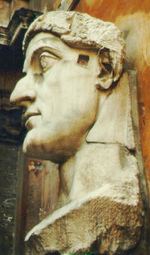|
|
 Reforms of Diocletian and Constantine
Reforms of Diocletian and ConstantinePage 6

Constantine the Great died in 337 A.D. He has met with rare and deep appreciation from many different points of view. The Roman senate, according to the historian of the fourth century, Eutropius, enrolled Constantine among the gods; history has named him the Great; and the church has proclaimed him a saint and equal of the Apostles (Isoapostolic). Modern historians have likened him to Peter of Russia and Napoleon. Eusebius of Caesarea wrote his Panegyric of Constantine to glorify the triumph of Christianity in putting an end to the creations of Satan, the false gods, and destroying the pagan states:
One God was proclaimed to all mankind. At the same time one universal power, the Roman Empire, arose and flourished. At the selfsame period, by the express appointment of the same God, two roots of blessing, the Roman Empire and the doctrine of Christian piety, sprang up together for the benefit or men Two mighty powers starting from the same point, the Roman Empire swayed by a single sovereign and the Christian religion, subdued and reconciled all these contending elements
Elpenor's note : monarchy was not absolute, as Vasilief suggests; some degree of self-government of the various cities of the empire, was never absent during the Byzantine period. Monarchy regarded the very general affairs, and even there it was not absolute, since the bodies that elected the king (bureaucracy, army and the people) could always change him. A revolution was considered almost a normal way of politics, when the king proved himself unworthy, which is the reason of many revolutions happening, without the social order of Byzantium being harmed; they were just for the change of the king or for the return to the throne of a king illegally deposed. Byzantium could not have lasted a millennium with this social cohesion and under so many difficulties, if it was a totalitarian state. As to the notorious conspiracies, recall also Runciman's remark, that if we take into account how longer was the Byzantine period we can see that there are much more American presidents murdered than Byzantine kings. Many emperors were men of letters and were interested in theology. For example, Manuel II Palaeologus’ thinking is such, that he can be read as we read the Fathers! This is not to say that all emperors were saints, but that they ought to be, an ideal granted to them by the society. That this was happening, and it was not only an ideology, is evident by the continuity of the social system, which was not disturbed for over a millennium!, during which Byzantium was being constantly attacked from North, East, South and even from the West, and is also evident by the fact that until today Greek people, those who have not entirely lost their memory immitating the western opportunism, hold the Byzantine emperor in a great esteem, I would say love.
Cf. Ancient Greece and Christianity (text in Greek only) ||| Byzantium : heir to the Graeco-roman antiquity
A History of the Byzantine Empire - Table of Contents
Next Chapter : From Constantine to the Early Sixth Century
Previous Chapter : The foundation of Constantinople
|
|
Reference address : https://ellopos.net/elpenor/vasilief/reforms-diocletian-constantine.asp?pg=6